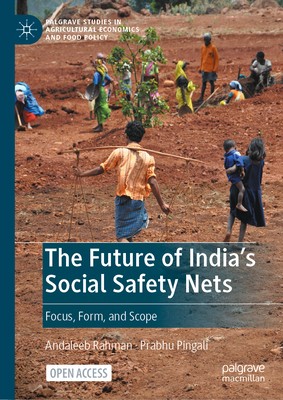
- We will send in 10–14 business days.
- Author: Andaleeb Rahman
- Publisher: Palgrave Macmillan
- ISBN-10: 3031507460
- ISBN-13: 9783031507465
- Format: 14.8 x 21 x 2.5 cm, hardcover
- Language: English
- SAVE -10% with code: EXTRA
Reviews
Description
This open access book provides a comprehensive analysis of India's safety net system: its evolution, efficacy, political economy, regional disparities and potential for innovation. This book studies multiple safety schemes addressing different aspects of development, with an overarching goal on how Indian social policy can move from schemes to a system that ensures a robust social protection. More specifically, it evaluates India's safety nets in terms of their effect on food security, poverty, child nutrition, human capital attainment, women empowerment, livelihood security, health outcomes, and inequality-various aspects of development resilience.
Most of the social programs in India were conceptualized in particular contexts, and therefore had specific objectives and intended beneficiaries. This book is unique in that it introduces a framework to study India's social safety net system in terms of three aspects: scope, form and focus. Scope refers to the objectives of safety net programs, focus refers to the beneficiaries and form refers to the modality or the design. This book specifically looks at older social safety net programs that address the core functions of hunger and protecting income, as well as those whose policy scopes have expanded towards addressing pathways out of intergenerational poverty and facilitating development resilience. In addition to state-supported schemes, which provide assistance to the poor, newer forms of market-based instruments such as subsidized health insurance programs are also examined. This book concludes by looking at political economy considerations and effective governance and how social safety nets can be remodeled for a rising India.
EXTRA 10 % discount with code: EXTRA
The promotion ends in 16d.12:41:06
The discount code is valid when purchasing from 10 €. Discounts do not stack.
- Author: Andaleeb Rahman
- Publisher: Palgrave Macmillan
- ISBN-10: 3031507460
- ISBN-13: 9783031507465
- Format: 14.8 x 21 x 2.5 cm, hardcover
- Language: English English
This open access book provides a comprehensive analysis of India's safety net system: its evolution, efficacy, political economy, regional disparities and potential for innovation. This book studies multiple safety schemes addressing different aspects of development, with an overarching goal on how Indian social policy can move from schemes to a system that ensures a robust social protection. More specifically, it evaluates India's safety nets in terms of their effect on food security, poverty, child nutrition, human capital attainment, women empowerment, livelihood security, health outcomes, and inequality-various aspects of development resilience.
Most of the social programs in India were conceptualized in particular contexts, and therefore had specific objectives and intended beneficiaries. This book is unique in that it introduces a framework to study India's social safety net system in terms of three aspects: scope, form and focus. Scope refers to the objectives of safety net programs, focus refers to the beneficiaries and form refers to the modality or the design. This book specifically looks at older social safety net programs that address the core functions of hunger and protecting income, as well as those whose policy scopes have expanded towards addressing pathways out of intergenerational poverty and facilitating development resilience. In addition to state-supported schemes, which provide assistance to the poor, newer forms of market-based instruments such as subsidized health insurance programs are also examined. This book concludes by looking at political economy considerations and effective governance and how social safety nets can be remodeled for a rising India.


Reviews